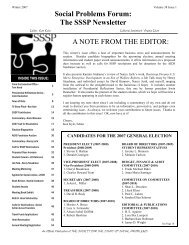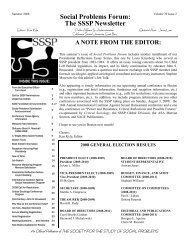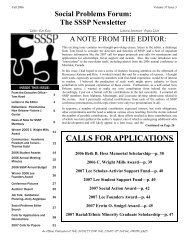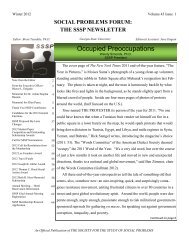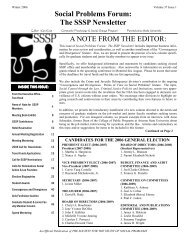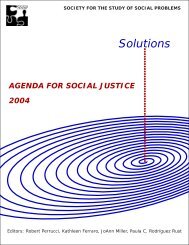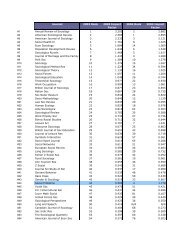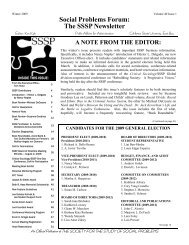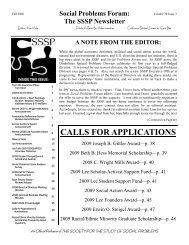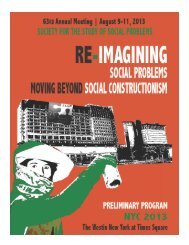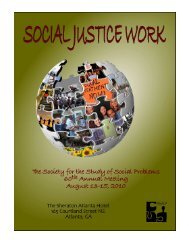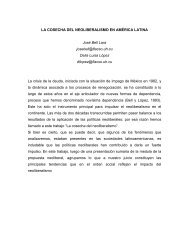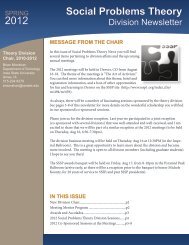in recognition of past and present service - Society for the Study of ...
in recognition of past and present service - Society for the Study of ...
in recognition of past and present service - Society for the Study of ...
Create successful ePaper yourself
Turn your PDF publications into a flip-book with our unique Google optimized e-Paper software.
PRELIMINARY PROGRAM<br />
The <strong>Society</strong> <strong>for</strong> <strong>the</strong> <strong>Study</strong> <strong>of</strong> Social Problems<br />
63rd Annual Meet<strong>in</strong>g<br />
August 9-11, 2013<br />
The West<strong>in</strong> New York at Times Square<br />
270 West 43rd Street<br />
2013 Theme: Re-imag<strong>in</strong><strong>in</strong>g Social Problems: Mov<strong>in</strong>g Beyond Social Constructionism<br />
R.A. Dello Buono, SSSP President 2012-2013<br />
1<br />
‘The question is not whe<strong>the</strong>r we should take sides,<br />
s<strong>in</strong>ce we <strong>in</strong>evitably will, but ra<strong>the</strong>r whose side we are on.’<br />
Howard S. Becker, SSSP Presidential Address, 1966<br />
‘However <strong>in</strong>advertently, <strong>the</strong> societal reaction school purged<br />
<strong>the</strong> elemental dialectic <strong>of</strong> resistance from social life.’<br />
Francis Fox Piven, SSSP Presidential Address, 1980<br />
‘How might we - as social scientists concerned with social<br />
justice - also re<strong>in</strong>scribe <strong>and</strong>, <strong>the</strong>reby, also partially subvert<br />
<strong>the</strong> networks <strong>of</strong> liquid CAPITAList power that engulf us daily?’<br />
Stephen J. Pfohl, SSSP Presidential Address, 1992<br />
‘Sociologists <strong>and</strong> o<strong>the</strong>r social scientists must quickly seize <strong>the</strong> day.<br />
Our research <strong>and</strong> writ<strong>in</strong>gs must move beyond criticiz<strong>in</strong>g new<br />
privatization. We must imag<strong>in</strong>e alternatives.’<br />
Nancy C. Jurik, SSSP Presidential Address, 2003<br />
As C. Wright Mills once wrote <strong>in</strong> a letter to E. P. Thompson: "I have to do it: it's my god-damned duty, because nobody else will<br />
st<strong>and</strong> up <strong>and</strong> say shit out loud." Scarcely six decades have passed s<strong>in</strong>ce Mills’ iconic voice fell silent. But his spirit lives on <strong>in</strong> <strong>the</strong><br />
SSSP <strong>and</strong> his <strong>in</strong>sights have never been timelier. In 2013, <strong>the</strong> SSSP returns to New York City, <strong>the</strong> <strong>in</strong>tellectual home <strong>of</strong> Mills <strong>and</strong> yes,<br />
to Wall Street, one <strong>of</strong> <strong>the</strong> pillars he identified <strong>of</strong> <strong>the</strong> power elite that “characterizes <strong>the</strong> structure <strong>of</strong> our epoch.”<br />
The unprecedented global crisis that has unfolded s<strong>in</strong>ce Mills was “say<strong>in</strong>g his shit out loud” now dem<strong>and</strong>s that we re-imag<strong>in</strong>e <strong>the</strong><br />
way we underst<strong>and</strong> <strong>the</strong> very nature <strong>of</strong> social problems. The sometimes subtle <strong>and</strong> always complex <strong>in</strong>terrelationships between<br />
personal troubles, public issues <strong>and</strong> global dilemmas have become re-arranged as substantially as have <strong>the</strong> structures <strong>of</strong> <strong>the</strong><br />
“power elite.” Problems rooted <strong>in</strong> <strong>the</strong> <strong>in</strong>adequacies <strong>of</strong> <strong>the</strong> Fordist welfare state were exacerbated by those based <strong>in</strong> <strong>the</strong> harsh<br />
realities <strong>of</strong> <strong>the</strong> neoliberal life-cycle. This neoliberal system now f<strong>in</strong>ds itself rife with contradictions <strong>in</strong> <strong>the</strong> search <strong>for</strong> a postneoliberal<br />
mode <strong>of</strong> global capitalist expansion. Social movements all around <strong>the</strong> world have mounted resistance to this<br />
restructur<strong>in</strong>g. Novel <strong>for</strong>ms <strong>of</strong> protest like “Occupy Wall Street” help illustrate a broader trend towards transnationalized social<br />
movement mobilization. From <strong>the</strong> Arab Spr<strong>in</strong>g <strong>and</strong> <strong>the</strong> leftist upsurge <strong>in</strong> Lat<strong>in</strong> America to <strong>the</strong> anti-austerity trade union <strong>and</strong><br />
student movements stretch<strong>in</strong>g all across <strong>the</strong> global North, popular movements have engaged <strong>and</strong> impacted <strong>the</strong> structural path<br />
<strong>of</strong> global development. Right-w<strong>in</strong>g “populism” <strong>and</strong> Islamic fundamentalism have also shaped <strong>the</strong> broader political l<strong>and</strong>scape,<br />
putt<strong>in</strong>g <strong>for</strong>th conservative <strong>and</strong> reactionary plat<strong>for</strong>ms that pose as “solutions” to <strong>the</strong> everyday problems confront<strong>in</strong>g poor <strong>and</strong><br />
work<strong>in</strong>g people.<br />
We might recall an important <strong>in</strong>sight <strong>of</strong> our founders, Al <strong>and</strong> Betty Lee, that social scientists have too <strong>of</strong>ten been caught runn<strong>in</strong>g<br />
beh<strong>in</strong>d <strong>the</strong> curve <strong>of</strong> social change. This thought was echoed by C.W. Mills <strong>in</strong> one <strong>of</strong> his earliest works where he was sharply critical<br />
<strong>of</strong> “social pathologists” whose social problems textbooks dealt “<strong>in</strong> a fragmentary way with scattered problems <strong>and</strong> were not<br />
focused on larger stratifications or upon structured whole… fail<strong>in</strong>g to consider whe<strong>the</strong>r or not certa<strong>in</strong> groups or <strong>in</strong>dividuals<br />
caught <strong>in</strong> economically underprivileged situations can possibly obta<strong>in</strong> <strong>the</strong> current goals without drastic shifts <strong>in</strong> <strong>the</strong> basic<br />
<strong>in</strong>stitutions which channel <strong>and</strong> promote <strong>the</strong>m.” This k<strong>in</strong>d <strong>of</strong> structural, political economy approach put <strong>for</strong>ward by Mills <strong>and</strong><br />
fur<strong>the</strong>r developed by Gouldner <strong>and</strong> many o<strong>the</strong>r critical sociologists spawned important contributions just as it questioned our<br />
own pr<strong>of</strong>essional position<strong>in</strong>g as teachers, researchers <strong>and</strong>/or social practitioners. Meanwhile, social constructionist approaches<br />
emerged <strong>and</strong> developed <strong>in</strong> a parallel trajectory dur<strong>in</strong>g <strong>the</strong> later decades <strong>of</strong> <strong>the</strong> 20 th Century, <strong>of</strong>fer<strong>in</strong>g <strong>the</strong>ir own powerful critiques<br />
<strong>of</strong> <strong>the</strong> sociological ma<strong>in</strong>stream.



